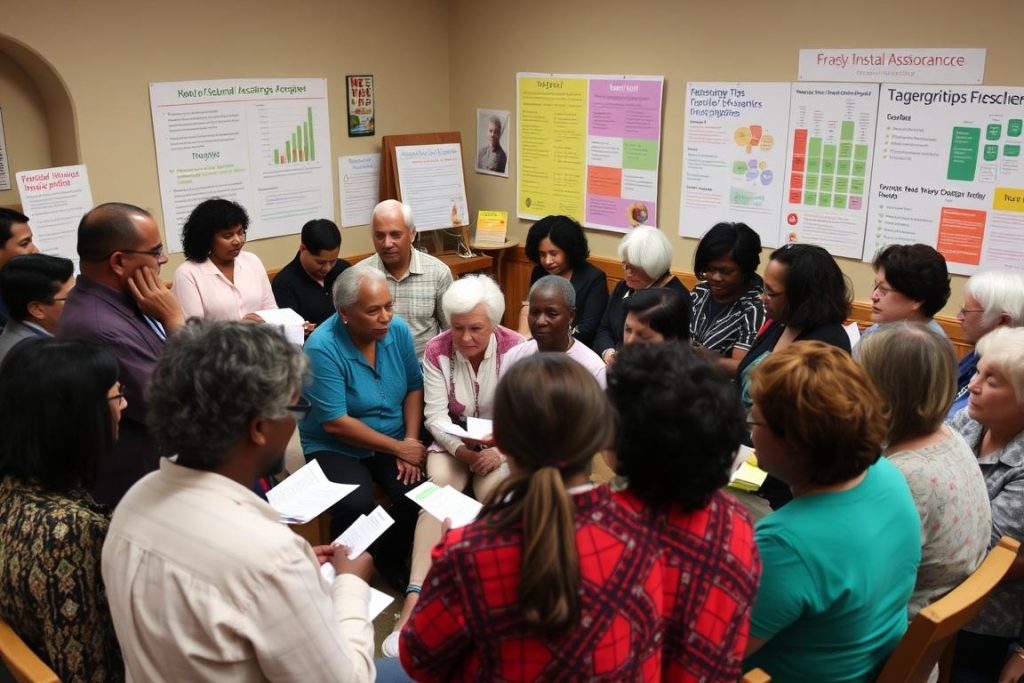A whopping 92% of small businesses that looked for CARES Act funds had little luck. This shows how tough times are for many small businesses during the economic shutdown. With stimulus funds harder to get, small businesses are looking elsewhere for financial help to keep going.
Digital innovation is now a must for small businesses trying to recover. Facebook and Google are giving grants and ad credits to help them keep up with online marketing and sales. This isn’t just to stay in the game; it’s to keep their doors open. With money tight and no end in sight to these hard times, businesses need to quickly adapt to online ways.
Facing money troubles? There are ways to manage your debt and handle your finances wisely. It’s all about using every financial tool available, getting into digital solutions, and supporting community efforts.
Key Takeaways
- A staggering 92% of small businesses applied for CARES Act funding, with minimal success.
- Digital innovation is crucial for small business recovery during the economic shutdown.
- Tech giants like Facebook and Google provide grants and ad credits to aid struggling businesses.
- Embracing cutting-edge marketing and retail techniques can help businesses stay afloat.
- Adopting online marketing and transaction methods is essential for survival.
Understanding Financial Assistance Programs and Their Resources
Going through tough economic times, finding the right financial assistance programs is key. These programs include federal help and aid from nonprofit groups. Knowing what help is out there lets you choose wisely.
Government Grants
Government grants offer big support for specific groups and people. For instance, small businesses got a boost from the CARES Act. Despite hiccups, it helped. Interest rates were cut by the Federal Reserve to help the economy. States like Arizona gave out stimulus checks and Florida and Tennessee gave teacher bonuses3. Make sure to check if you’re eligible for these grants. Missing deadlines might mean missing out on important help3.

Emergency Funding Options
In tough times, emergency funding is a lifeline. This support comes from both the federal and state levels. Cities such as Chicago and Los Angeles came up with new ways to give money to those in need4. These efforts aim to give quick help. Remember to fill out the FAFSA early, starting October 1, to see what aid you could get4.
Charitable Assistance and Nonprofits
Nonprofits are crucial in offering help that meets community needs. They tackle problems like lack of food, unstable housing, and limited healthcare. Programs like the Pell Grant help students in need and dependents of veterans4. A chat with your school’s financial aid office can uncover more opportunities4.
Coping Strategies to Manage Without Stimulus Checks
As the pandemic affects economies, good financial planning becomes key to keeping stability. By looking into and using these plans, people can get through tough times.
Budgeting and Financial Planning
Making a budget is vital for financial stability. Check your income and expenses each month. See where you can cut costs, and make sure money goes to what you really need.
Add financial planning to your daily life to keep an eye on spending and save for future goals. Use free online tools and reports from the three national credit bureaus to watch your financial health5. Programs like the Low-Income Home Energy Assistance Program are there to help with your bills5.
Side Hustles and Additional Income Streams
Getting extra income from side hustles is a smart way to make more money. The gig economy is booming. It offers jobs like freelance work, online tutoring, and ride-sharing for extra cash.
Remote work options have grown, opening many doors to work from home. These opportunities are key for your financial plan, helping in recovery. Side hustles offer a safety net and a step towards a better financial future.
Community Assistance Programs
Community support programs are a lifeline for those in financial trouble. There are many support options, from help with rent to unemployment insurance. For instance, the Emergency Rental Assistance Program has set aside $25 billion to aid households in need because of COVID-195.
Programs like Arizona’s work bonuses and Seattle’s relief funds show community efforts in economic recovery6. These efforts help people fight financial troubles together, using shared resources.
With smart budgeting, side jobs, and community help, people can face financial challenges better. They can aim for a stable and secure future.
Conclusion
Today’s economy demands more than just stimulus checks to build financial strength. Using tech can greatly improve your money management and business. It gives you the tools to handle tough times well. By looking for more ways to make money, you aren’t just protecting your finances. You’re also creating a path to lasting financial health.
Support from your community is key on this path. State and local programs have shown they can really help people and businesses recover after the pandemic. For example, hospitals have been able to help more patients and emergency visits with financial aid programs7. And, in places like Washington State, hospitals must tell patients about help with bills. This shows how important easy-to-find help is for financial strength8.
To really be financially healthy, you need to use these resources wisely. Government help like Medicaid and SNAP has helped millions9. Knowing and using these programs can cut down on unpaid medical bills and better your financial control. Learning to use all these resources together can build a strong financial base. This way, you’re ready for a flourishing future, even without extra stimulus help.
FAQ
What types of financial assistance programs are available to small businesses?
How can small businesses leverage digital innovation to stay afloat during financial struggles?
What is the process to apply for government grants and financial aid?
What emergency funding options are there for individuals and businesses in crisis?
How can charitable assistance and nonprofits help during financial hardships?
What budgeting and financial planning strategies are effective without stimulus checks?
How can individuals generate additional income through side hustles?
What role do community assistance programs play in economic recovery?
How does one access financial support resources provided by nonprofit organizations?
Source Links
- Paying Bills During a Financial Crisis – https://www.orangecountyscu.org/stories/paying-bills-during-a-financial-crisis/
- Survey: Surprisingly Fewer People Losing Sleep Over Money Issues | Bankrate – https://www.bankrate.com/credit-cards/news/losing-sleep-survey/
- College For All Texans: Types of Financial Aid – http://www.collegeforalltexans.com/index.cfm?objectid=699B6A67-A725-CF93-E4BE5B7F74474508
- Federal Financial Aid Programs – https://comptroller.texas.gov/programs/education/msp/funding/aid/federal-programs/
- Personal Finance and Consumer Protection – Steps for Quicker Financial Relief – https://home.treasury.gov/policy-issues/consumer-policy/personal-finance-and-consumer-protection-steps-for-quicker-financial-relief
- Change in Financial Stress and Relational Wellbeing During COVID-19: Exacerbating and Alleviating Influences – https://www.ncbi.nlm.nih.gov/pmc/articles/PMC9931994/
- The Impact of Financial Assistance Programs on Health Care Utilization: Evidence from Kaiser Permanente – https://www.ncbi.nlm.nih.gov/pmc/articles/PMC9634821/
- Understanding Required Financial Assistance in Medical Care | Consumer Financial Protection Bureau – https://www.consumerfinance.gov/data-research/research-reports/understanding-required-financial-assistance-in-medical-care/
- Financial Behaviors, Government Assistance, and Financial Satisfaction – https://www.ncbi.nlm.nih.gov/pmc/articles/PMC9841485/

